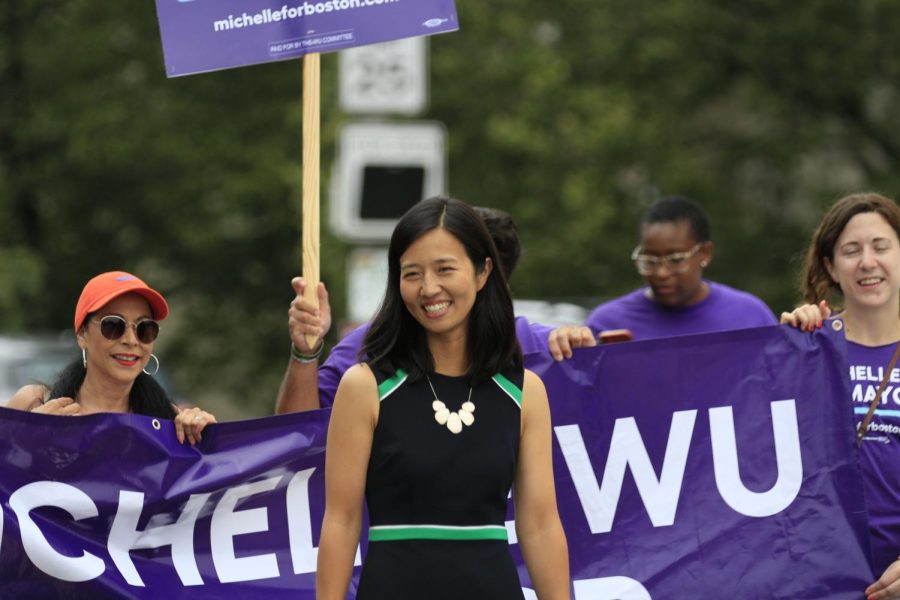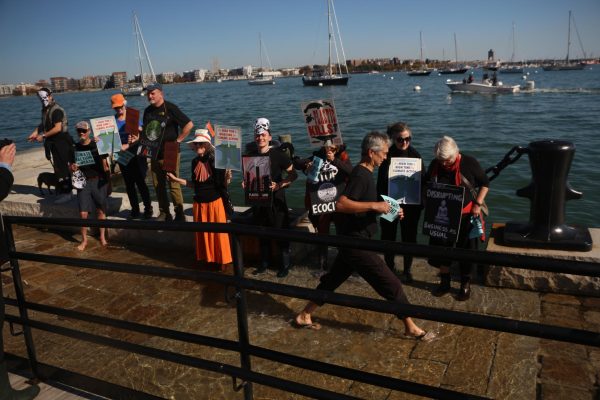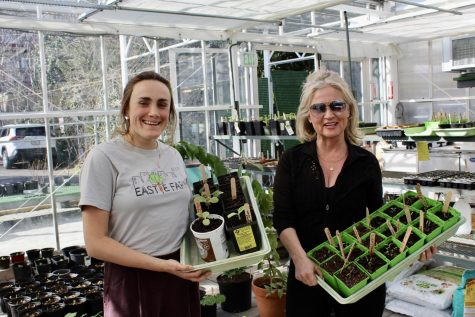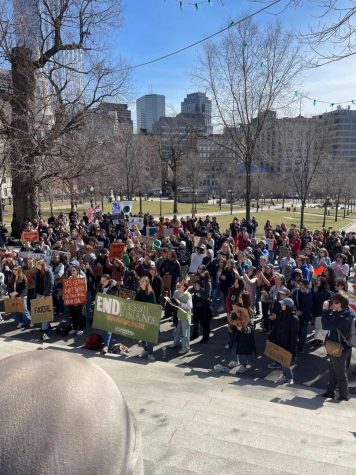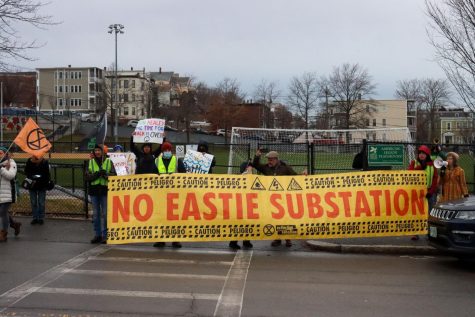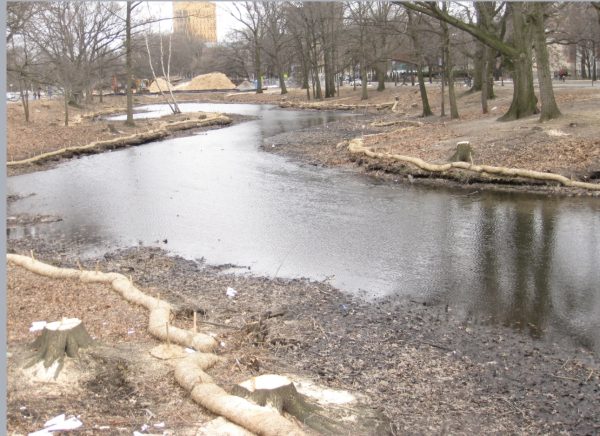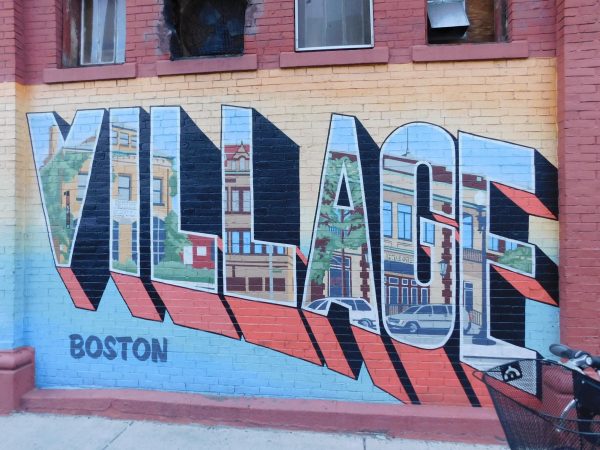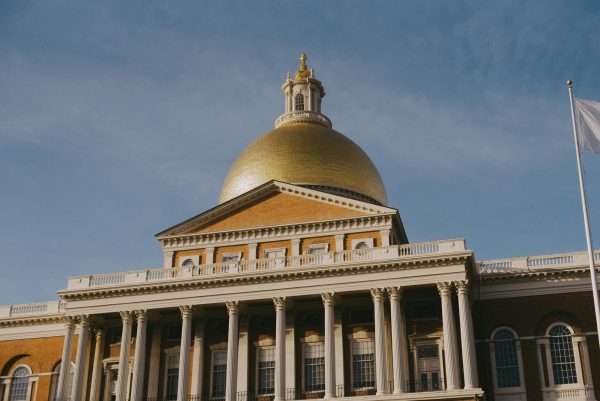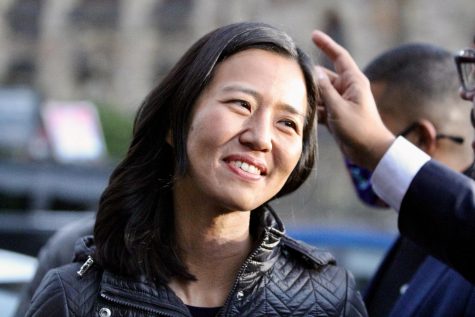Mayor Wu’s policies instill hope for mitigating the climate crisis
Mayor Wu ran a campaign of strong progressive climate policies. Almost a year and a half into office, how are her policies faring?
Photo: Lex Weaver
Mayor Wu, who was at the time a mayoral candidate and City Councilor, walks with volunteers at the Roxbury Unity Day Parade on July 18, 2021. A large part of her campaign was progressive climate policies.
Michelle Wu’s historic election — as the first woman, person of color and Asian American to serve as Boston mayor in 2021 — left many wondering how the progressive climate policies in her campaign would actually be implemented.
As the city continues to experience the drastic effects of climate change, such as warming winters and threats of flooding from rising sea levels, local environmental leaders are stressing the importance of taking action now in order to curb greenhouse gas emissions and prevent further damage in the foreseeable instances of extreme weather.
While Wu has only been in office for just over a year, her campaign’s adamant focus on climate justice policy and legislation has carried through to her agenda as mayor. Initially, some feared that the Green New Deal and Just Recovery framework she originally adopted while serving as a city councilor acted as a lofty concept rather than a concrete plan to combat the effects of the climate crisis in Boston. Despite these early concerns, many community environmental activists and organizations now point to Wu as a climate leader in both her policy and her climate justice philosophy.
“For us, the real promise that Mayor Wu brought to the campaign when she was first running was the idea of the intersectionality of climate,” said David Melly, a legislative director for The Environmental League of Massachusetts, about the ELM Action Fund’s endorsement.
Kannan Thiruvengadam, the director of Eastie Farm and a member of the city’s Community Preservation Committee, agrees with Melly. He believes City Hall seemed less accessible prior to Wu’s administration and that her commitment to climate justice has allowed him to feel seen as a grassroots organizer and urban farmer. He also noted that the advancement of a Good Food Purchasing Program supported by Wu back in 2019 indicates her “very deep understanding and a systemic approach” on how to properly address the ways the climate crisis impacts people on a very basic level.
“It does make a difference whether the top of the administration is already aligned in terms of acting on climate at the city level,” Thiruvengadam said. “The Green New Deal that she has proposed is a testament to that.”
Leading up to the 2021 election, Wu clinched endorsements from several climate crisis and environment-focused organizations, including The ELM Action Fund, The Sierra Club and 350 Massachusetts Action.
The main distinction between Wu and her predecessors’ climate policies is her commitment to climate justice. Climate justice takes other forms of inequity into consideration in order to highlight how climate change more harshly impacts individuals who are already at a social or economic disadvantage.
“A local Green New Deal and Just Recovery must direct this scale of collective action to take aim at the root causes of systemic injustices,” Wu wrote in her 2020 Green New Deal plan.
This framework allows for the city to properly address the impacts the climate crisis has daily on citizens, and specifically how these impacts intersect with other issues such as housing and transportation justice.
One of Wu’s major plans is to decarbonize buildings throughout Greater Boston, in order to reach citywide carbon neutrality by 2040. This has been recognized by advocates as one of the most important focuses of climate legislation for this upcoming year.
“If we are going to meet our climate targets, if we are going to decarbonize our state, we need to start doing a lot around new and existing buildings,” said Logan Malick, the clean energy director for the Massachusetts Climate Action Network, who supports Wu’s Green Deal and its decarbonization efforts.
Malick noted that building energy consumption is responsible for the majority of carbon emissions in the city of Boston, compared to transportation being the biggest emitter statewide.
Anywhere from 70-90% of buildings under construction currently will be standing by 2050, Melly added. The focus, then, remains on decarbonizing the production of new buildings as well as retrofitting buildings already standing in order to meet Wu’s Green Deal goals.
In January, Wu reiterated this importance of sustainable construction, proposing an executive order that would require all new city construction and major renovations of public buildings to be completely fossil-fuel free.
Along with decarbonization, another major climate issue Boston residents will continue to face is extreme temperatures in the summer. Melly points to Wu’s announcement in September 2022 of an updated urban forest plan that focuses on increasing urban green space and tree canopy as another accomplishment since she took office. The preservation and increase of Boston’s tree canopy will drastically mitigate urban heat island effects.
Before Wu, climate policy generally hadn’t appeared to be a priority in Boston, said Hessann Farooqi, an advocacy director for the Boston Climate Action Network. While past mayoral administrations brought some important change to the city regarding legislation, such as the Building Emissions Reduction and Disclosure Ordinance (BERDO) 2.0 passed in September 2021 under former Mayor Marty Walsh, he said City Hall has primarily underwhelmed climate advocates.
“At both the city and state level, we see, I think, a lot of folks with generally good intentions, but a system that moved far too slowly and often in a way that did not center the needs of those who are already facing the strongest headwinds in society,” Farooqi said.
Malick agreed that besides BERDO, the climate crisis has not been at the forefront for the city and state government. Historically, local government has semantically situated itself as paving the way for environmental legislation but falls “short when it comes to the details.”
He stressed that Wu’s administration has given the climate justice movement a sense of resurgence: “But with this new mayor, the priority of climate justice, environmental justice has increased significantly.”
However, while there has been progress under Wu’s administration, some of the policies she campaigned on need to have the details sorted out, according to Malick. But he acknowledges that much of it requires statewide cooperation.
Farooqi agrees, using Wu’s transportation justice agenda as an example of how her policies have not drastically advanced for reasons beyond her immediate control. Because the MBTA is a state agency, improving bus service and implementing transportation reform can be inhibited by what Farooqi calls “a small sea of conservative attitude among those on Beacon Hill” in both the House and the Senate.
Ultimately, after just over a year in office, Wu has left several members of the climate justice and advocacy communities feeling hopeful of Boston’s potential to become a true leader in combating the climate crisis.
Advocates praise her efforts to create policy that considers the needs of everyone, especially the most vulnerable members of our communities.
“At the end of the day, policies are about people,” Malik said.

